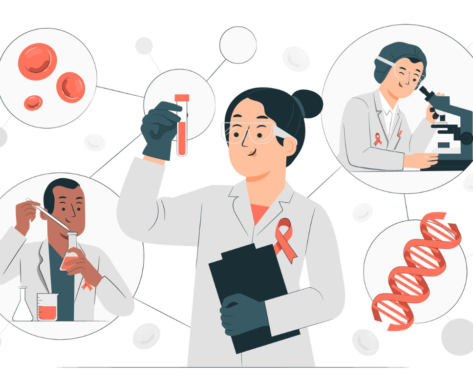LESSON OVERVIEW
The main objectives of this lesson on ethical dilemmas are to:
- explore ethical dilemmas in science, technology, and society;
- practise key phrases to express opinions on these topics;
- watch a video on CRISPR gene editing technology.
With this lesson, students talk about ethical dilemmas in science and society (e.g. using animals in medical research, allowing human cloning, etc.). They discuss comments on these dilemmas and practise phrases to express their opinions (e.g. having said that, if you look at the big picture, one could argue that, etc.). Students also watch and discuss a video on gene editing technology and give their opinions on the topic.
WARM-UP AND VOCABULARY
This lesson on ethical dilemmas starts with a warm-up. Students think of examples of ethical dilemmas in different areas (e.g. medicine, new technologies and environment). After that, they imagine the world’s brightest minds are going to discuss humanity’s most pressing issues (e.g. Should human cloning be legal?), so students try to rank them in order of importance. Then, they explain their ranking. Following that, students read comments on ethical debates in science (e.g. Some decisions were badly made but it’s easy to say that in hindsight.) and match them to the questions in the previous task. Next, they look at the phrases in bold in the comments (e.g. in hindsight, to say the least, a case in point, etc.) again and match them with their definitions. Afterwards, students choose the correct phrase to complete statements about opinions on technology, work, and society (e.g. When I realized what the scientists achieved, I was amazed for that matter/to say the least.). Subsequently, they choose questions about ethical considerations in science and society (e.g. Should animal testing be allowed in the cosmetics industry?) and discuss them. While discussing them, students use the target phrases from the lesson.
VIDEO AND DISCUSSION
At this point in the lesson on ethical dilemmas, students complete gaps in statements about genetic science with words like genome, genetically, genetic and genetics. After that, they discuss questions about their knowledge and opinion on genetics and GMOs. Then, they watch the first part of a video where a scientist talks about CRISPR gene editing technology. They read and choose the statement which most accurately describes the scientist’s general thoughts about the technology. Students can also add some details. Afterwards, they watch the second part of the video and tick the statements that are true. Next, students say which adjectives (e.g. exciting, scary, life-changing, etc.) they would use to describe the CRISPR gene editing technology and explain why. Following that, they read opinions about the CRISPR technology and complete the gaps with the target phrases from the lesson. Finally, students choose five opinions from the previous exercise, say whether they agree with them or not and give details.
HOMEWORK/REVISION
This lesson plan also includes an additional task that you can use as homework or revision. In the task, students split sentences into two, maintaining the same meaning. They use the target phrases from the lesson in each new sentence. The task is available in the teacher’s version of the worksheet. You can print it and hand it out to your students. It’s also included in the e-lesson plan.
WORKSHEETS
Subscribe to unlock these and many other Standalone lesson with the Premium plan
Subscribe













This is sucha a good lesson plan, thank you Ewa 🙂
Thank you very much for the comment 🙂
I always love how you explore the language in your lessons, Ewa! I have been teaching for 20 years and I am often mindblown 😍
Thanks, you made my day 🙂
What an amazing lesson!
Excellent vocabulary, helpful exercises, and efficient as well. great practice, and lots of conversation.
Thank you guys!
It’s our pleasure 🙂 Thanks for the comment!
Ewa you always have the best lessons!
Thank you for your kind words 🙂